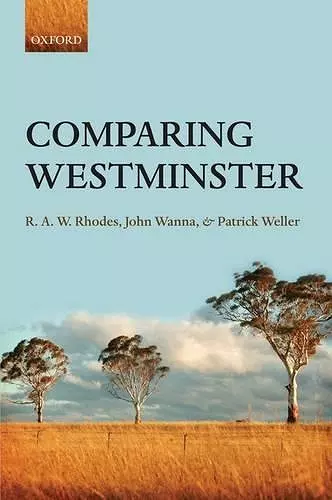Comparing Westminster
John Wanna author Patrick Weller author R AW Rhodes author
Format:Hardback
Publisher:Oxford University Press
Published:27th Aug '09
Currently unavailable, and unfortunately no date known when it will be back
This hardback is available in another edition too:
- Paperback£45.49was £45.49(9780199695584)

This book explores how the governmental elites in Australia, Britain, Canada, New Zealand, and South Africa understand their Westminster system. It examines in detail four interrelated features of Westminster systems. Firstly, the increasing centralisation in collective, responsible cabinet government. Second, the constitutional convention of ministerial and collective responsibility. Third, the role of a professional, non-partisan public service. And finally, parliament's relationship to the executive. The authors explain the changes that have occured in the Westminster model by analysing four traditions: royal prerogative, responsible government, constitutional bureaucracy, and representative government. They suggest that each tradition has a recurring dilemma, between centralisation and decentralisation, party government and ministerial responsibility, professionalisation and politicisation, and finally elitism and participation. They go on to argue that these dilemmas recur in four present-day debates: the growth of prime ministerial power, the decline in individual and collective ministerial accountability, politicisation of the public service, and executive dominance of the legislature. They conclude by identifying five meanings of - or narratives about - Westminster. Firstly, 'Westminster as heritage' - elite actors' shared governmental narrative understood as both precedents and nostalgia. Second, 'Westminster as political tool' - the expedient cloak worn by governments and politicians to defend themselves and criticise opponents. Third, 'Westminster as legitimising tradition' - providing legitimacy and a context for elite actions, serving as a point of reference to navigate this uncertain world. Fourth, 'Westminster as institutional category' - it remains a useful descriptor of a loose family of governments with shared origins and characteristics. Finally, 'Westminster as an effective political system' - it is a more effective and efficient political system than consensual parliamentary governments. Westminster is a flexible family of ideas that is useful for many purposes and survives, even thrives, because of its meaning in use to élite actors.
an exceptionally intelligent book which brings to subject of political institutions subtleties of interpretation which only sound scholarship allows. * Arthur Aughey, Parliamentary Affairs *
full of interesting insights and stories, and is rich in detail of the operation of the political system in the chosen countries. The way in which politicians appeal to the term Westminster is revealing. * Eoin OMalley, Political Studies Review *
Rhodes, Wanna and Weller...are interested in taking a new approach to the comparative study of a well-known family of political systems, which breaks from previous staid approaches. In doing so, the authors have at the very least provided an up to date discussion of how Westminster core executives currently operate, and succeeded in making Westminster interested again. * Ben Yong, UCL, Public Law Journal *
ISBN: 9780199563494
Dimensions: 241mm x 162mm x 21mm
Weight: 604g
276 pages